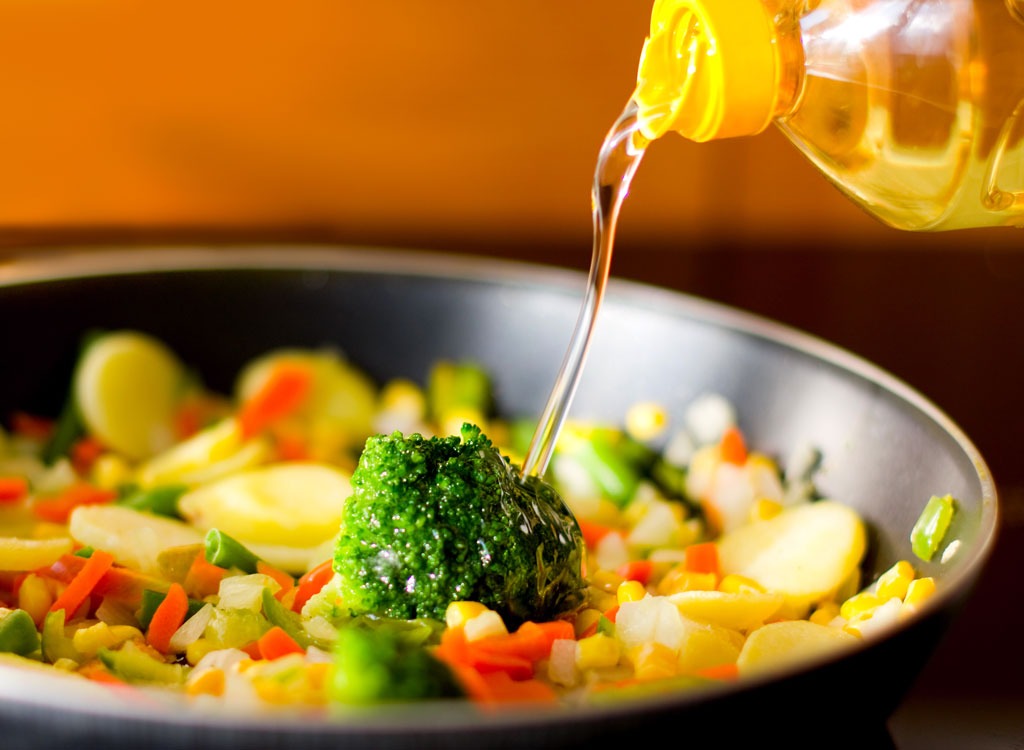5 Reasons Vegetable Oil is Worse Than Sugar

If sugar was a supervillain it would definitely be the Joker. Literally everyone—even those who have never seen a single Batman movie—knows that the Joker is a bad dude. The same can be said about the white granular stuff. When eaten in excess, it’s no good for us—we know this. In fact, the authors of a 2014 editorial in the journal JAMA Internal Medicine, went so far as to say that “Too much sugar does not just make us fat; it can also make us sick.” (That’s why our founder wrote an entire book about how to eat less of it. Order your copy of the Zero Sugar Diet today!)
But here’s the thing—if sugar’s the Joker, vegetable oil is the Penguin: slimy, globulus and hard to pin down. And it’s in just as many food products as sugar, too. That’s why many nutritionists consider things like canola, corn, cottonseed, palm, soy, sunflower, safflower, rice bran, and grapeseed oils to be far worse than the sweet stuff. And we’re still in the process of learning about all the ill effects. Up until the 1950s, when butter and coconut oil were first wrongly blamed for the rise in heart disease, we weren’t eating these processed oils. So we’re just now seeing what years and years of eating the stuff can do.
Scary, right?
Read on to learn how else these shady oils can impact your health and how you can stay out of harm’s way—without totally overhauling your diet. And if you’re left wondering which fats are the healthy ones, clear up the confusion with the help of our special report 20 Healthy Fats to Make You Thin.
It Can Cause Weight Gain

Go ahead, grab a few packaged foods from your kitchen and examine the food labels. There’s a good chance you’ll find soybean oil in almost everything. For years the popular vegetable oil was considered a better alternative to saturated fats like butter. However, recent animal research suggests that when it comes to weight gain, soybean oil may actually be far worse than sugar.
To come to this finding, University of California researchers divided mice into four groups. All groups were fed diets comprised of 40 percent fat and were given the same number of calories. Where the diets differed was in the type of fat they were served. Two groups were fed a diet rich in coconut oil, a popular source of saturated fat. One of those two groups were also given fructose, a type of sugar. The other mice were given a soybean oil-heavy diet, equal to the amount a typical American consumes. One of the two soybean groups was also given fructose. The researchers discovered that mice on the soybean oil diet gained 25 percent more weight than mice on the coconut oil diet and 12 percent more than groups who were also given fructose. The mice on the soybean oil diet developed larger fat deposits and were more likely to become diabetic. Mice given fructose had similar, but less severe, health issues.
Why did this happen? The researchers hypothesize that that soybean oil’s high omega-6 fatty acid content is to blame. Though our bodies need some omega-6s for optimal health, excessive amounts can increase appetite and slow the rate at which the body burns fat, causing weight gain. To maintain your flat belly, kick foods made with soybean oil out of your diet and incorporate some of these 50 Best Weight Loss Tips into your weekly routine.
It May Diminish Brain Function

When Dr. Catherine Shanahan, MD, told Kobe Bryant she’d help him clean up his diet, the first thing told him to do was cut out sugar and vegetable oils. Now that Kobe is off the court, she’s on a mission to get all American’s do the same. In her new book, Deep Nutrition: Why Your Genes Need Traditional Food, Shanahan explains that vegetable oils are the “brain’s worst enemy” because they increase the risk of brain conditions like Alzheimer’s and dementia. While she didn’t conduct a formal research study to back her claims, recent research by Professor Martin Grootveld of De Montfort University Leicester confirms Shanahan’s inklings.
According to his research, when sunflower and corn oil are cooked over high heat, they release toxic chemicals called aldehydes that have been linked to dementia, cancer, and heart disease. In his study, both of these oils produced aldehydes at levels 20 times higher than recommended by the World Health Organisation. So what should you use instead? Olive oil, butter and goose fat, all produced far fewer aldehydes, according to the De Montfort University Leicester study.
ICYMI: The Scary Toxins Hiding in Your Cookware and Storage Containers
It Can Harm Your Ticker

Ironically, it was the increasing rates of heart attacks in the 1950’s that convinced Americans to ditch the butter and start using processed vegetable oils. While these may have seemed like smarter options at first, recent research suggests that they may actually be far more detrimental to heart health than animal fats. In fact, one British Medical Journal study found that consuming too much vegetable oil may actually increase the risk of heart disease. Maria Elena Rodriguez, a registered dietitian who was not involved with the study, explains this occurs because diets that are high in vegetable oils can cause plaque buildup in the arteries, which is a major contributor to cardiovascular disease.
But how much qualifies “a lot” when it comes to vegetable oil? It’s hard to say. But since these sketchy oils are pretty much in all processed food, it’s safe to say that many of us are probably consuming too much of the stuff. Be sure to read food labels are keep items that are made with vegetable oils out of your shopping cart. And while we’ve got you thinking about keeping your ticker healthy, don’t miss these 30 Foods That Can Cause Heart Disease.
It’s Filled With Carcinogens

If vegetable oil’s effects on your heart wasn’t scary enough, The European Food Safety Authority issued a report last year warning consumers about the high levels of potentially carcinogenic contaminants in palm oil (an ingredient used in Kit Kat Bars, Nutella, and Cheez-Its, among other treats) when refined at temperatures above 392°F. This echoes the concerns that Grootveld and his team expressed about heating sunflower and corn oils—a process they found produces compounds that may cause cancer and other diseases.
While neither The European Food Safety Authority nor the World Health Organization has recommended consumers stop eating these refined oils, we’d rather be safe than sorry and keep these icky fats out of our diets.
It Can Cause Inflammation

Soy, corn, sunflower, safflower, and palm oils all have a high concentration of the inflammatory fat, omega-6, and are low in the anti-inflammatory fat, omega-3. In fact, Americans are eating so many vegetable-oil-laden products that the average person has an omega-6 to omega-3 ratio of around 20:1 when it should be 1:1. While inflammation is a natural, protective part of the body’s immune response, it’s only protective in low doses. When you constantly put your immune system in a state of attack, you can put your body into a chronic state of inflammation. Over time, this can cause weight gain, drowsiness, skin problems, digestive issues, and a host of diseases, including diabetes, cancer, and depression. To ward off inflammation, ditch the unhealthy oils and add a host of these 30 Best Anti-Inflammatory Foods to your daily diet.
So, What Should You Cook With Instead?

Does all of this feels like information overload? We totally get it—and we’ve got your back. Here are a few quick tips to help you avoid dangerous vegetable oils:
Read Labels
If you eat a lot of processed foods (things that aren’t fresh) or grub from restaurants, you should definitely start reading food labels and ingredient leaflets more carefully. Consider things made with canola, corn, cottonseed, palm, soy, sunflower, safflower, rice bran, and grapeseed oil “Not Thats” and look for options made with healthier fats like olive, coconut, avocado, and peanut oil.
Throw Out the Gnarly Nine
Consider canola, corn, cottonseed, palm, soy, sunflower, safflower, rice bran, and grapeseed oil the gnarly nine—unhealthy oils that don’t deserve a place in your kitchen. Restock your shelves and fridge with healthy fats like olive oil, coconut oil, and grass-fed butter (one of these 20 Best Full-Fat Foods For Weight Loss). Why grass-fed?
“Grass-fed butter an excellent source of vitamins, minerals, and fatty acids, and it helps slow down the absorption of sugar and carbohydrates, leading to consistent energy levels and improved brain function,” explains Cassie Bjork, RD, LD. “Plus, it tastes great and [studies have shown] the saturated fat in it is not linked to heart disease.”
Turn Down the Flame
If you enjoy using sunflower oil or corn oil, you don’t necessary have to kick them to the curb. Just don’t use them over a high flame. The research team that examined the dangers of heating these oils say they don’t release toxic chemicals until they reach 356 degrees. If you’re cooking, roasting or pan-frying, they suggest using olive oil.








